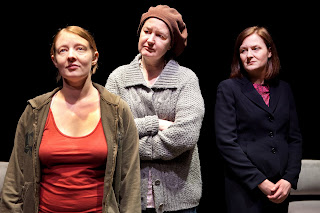athena lamarre, caroline gillis and sarah dodd
photo by cylla von tiedemann
Whenever I see a Daniel MacIvor play I can’t help being overcome with this strange nagging notion that his play was written specifically for me. Of course, this is obviously not the case, but without fail, each time the thoughts of his characters spill forth in candid hilarity or poignant profundity I find myself wondering how Daniel MacIvor managed to infiltrate my brain and suck out my secret thoughts and know the observations I have shoved so far back in the darkest corner of my mind that I haven’t even properly articulated them to myself yet. And yet, there these things all are, springing to life and ringing with a poetry that only Daniel MacIvor can script. For me, this guarantees a magical life at the theatre and MacIvor’s newest play, Communion, playing at Tarragon Theatre until April 4th, 2010, is certainly no exception.
A wise friend of mine believes that “all art is asking us, ‘Do you ever notice this?’”, and I think that MacIvor is a brilliant example of an artist who does just that. Since his plays are incredibly perceptive and have the ability to capture unique and detailed aspects of the human experience that we all share, the audience becomes instantly mesmerized by the characters he is presenting and drawn fervently into the stories that emerge from them. Communion begins with Leda, a terminally ill former alcoholic, trying vehemently to connect to her therapist, Carolyn. While Carolyn attempts to rouse enlightenment in her client through the use of specific, rigid questions and repetition untainted by judgements or opinions, Leda searches frantically for proof of Carolyn’s humanity. The result is one of the funniest therapy sessions of all time as Leda breaks all the rules by saturating her answers with sarcasm, throwing questions back to Carolyn and generally striving to be as difficult, evasive, aggressive and stubborn as possible. This simultaneously suggests the absurdity of the dynamics created by this sort of therapy and quickly evolves into a fascinating boxing match between Leda and her deepest fears.
Caroline Gillis makes a sharp departure from her previous two roles in MacIvor’s A Beautiful View and How It Works, which highlighted her endearingly quirky and awkward humour; with Leda she submerges herself in a much darker, and arguably deeper, well. She gives a beautifully compelling performance, striking a remarkable balance between evoking compassion and eliciting laughter. It can be argued that most playwrights haunt their work, but I felt that especially in this piece, Daniel MacIvor’s voice and presence seemed especially vivid in Leda, which is perhaps why the play resonates so strongly with me. Sarah Dodd plays Carolyn and barely speaks throughout the entire first scene of the play. Her reactions to Gillis’ antics are precise and subtle and her voice is so unbelievably steady and inexpressive that one becomes fascinated to see what would happen if Leda succeeded in breaking Carolyn’s stoic facade. When Dodd’s character cracks open in the third scene, we learn (not surprisingly) that she is just as lost and confused as everyone else.
Athena Lamarre plays Leda’s daughter, Annie, a young girl who has attached herself to an extreme patriarchal religious sect in an attempt to find the stability she did not have growing up with an alcoholic mother. Lamarre beautifully taints Annie’s exhibition of peace and serenity with a sharp, defensive, angry sense of fear. Throughout the play the lines MacIvor scripts for Annie say “I don’t care,” but the emotion comes from Lamarre whose actions so poignantly reveal the depth and scope of her feelings.
The word Communion can refer to the sacrament of the Eucharist received by a congregation or the part of the Mass or a liturgy in which the Eucharist is received. Leda refers to this Communion as the “Catholic Fashion Run-Way” as she recalls watching people intently as they came from Communion when she was a child. The word also means an interchange or sharing of thoughts and emotion or of holding in common and this commonality and desire to connect honestly and openly with one another seems to be the source of his play’s lasting power. When I was little, Holy Communion was my favourite part of Mass for this exact same reason and so in response to my wise friend’s question, I find myself saying, “Yes. Actually, I do notice that.” Daniel MacIvor may not have written Communion specifically for me, but in its ability to share and to create a fellowship with people, I think it’s fair to say that he’s written this play for us.
Communion plays until April 4th at Tarragon Theatre (30 Bridgeman Avenue). For more information or to book your tickets please call 416.531.1827 or visit www.tarragontheatre.com.







